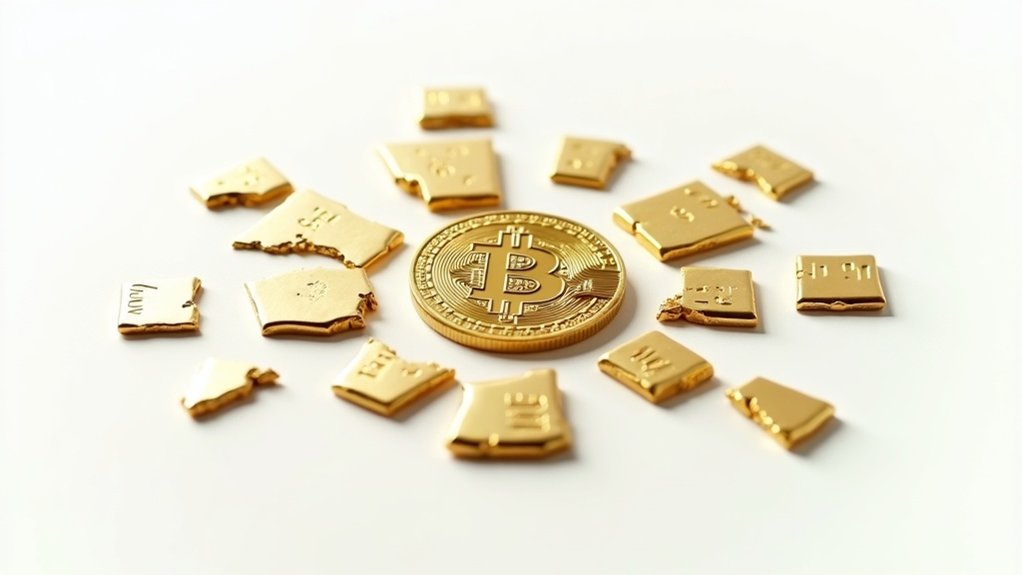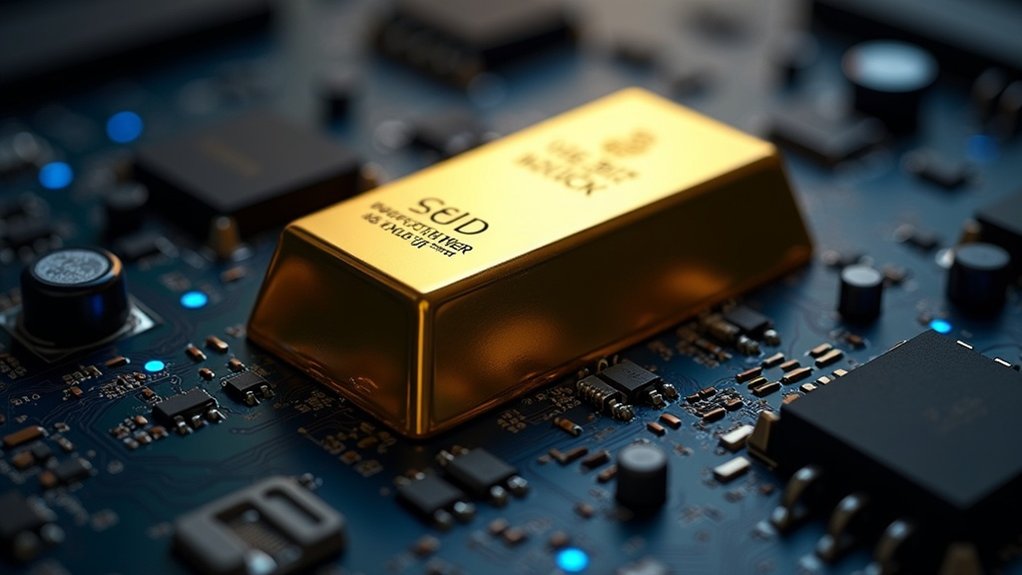WETH is simply ETH wrapped in an ERC-20 token format. It’s a 1:1 representation of Ethereum’s native currency, created to overcome ETH’s non-compliance with its own token standard. Crypto enthusiasts use WETH for DeFi applications, NFT marketplaces, and cross-chain activities. No value is lost in the conversion—just send ETH to a smart contract, get WETH back. Unwrap anytime. This workaround keeps the entire DeFi ecosystem functioning behind the scenes.
WETH, or Wrapped Ether, is the tokenized version of Ethereum’s native currency (ETH) that solves a surprisingly annoying problem. It transforms ETH into an ERC-20 token, making it compatible with the very blockchain it powers. Sounds ridiculous? It is. But it’s necessary.
WETH: turning Ethereum into a token that works on its own blockchain. The ultimate tech irony that keeps DeFi running.
Here’s the deal: Ethereum has its own token standard called ERC-20, created back in 2015. This standard requires tokens to have specific functions like transfer, approve, and balanceOf. The irony? ETH itself doesn’t follow these rules. It pre-dates the standard. Big oversight.
So when developers built decentralized apps requiring ERC-20 tokens, they hit a wall with ETH. The solution? Wrap it. WETH is literally ETH wrapped in an ERC-20 compliant package. One WETH equals one ETH. Always.
The process is simple. You send ETH to a smart contract. It locks up your ETH and mints an equivalent amount of WETH. Want your original ETH back? Unwrap it. The contract burns your WETH and releases your ETH. No fees (except gas). No tricks. Similar to smart contracts in DAOs, these processes execute automatically when predetermined conditions are met.
WETH’s importance in DeFi can’t be overstated. Without it, Ethereum’s native currency would be useless in its own ecosystem. Ironic, right? It enables ETH to function in decentralized exchanges like Uniswap, participate in yield farming, and place bids on NFT marketplaces like OpenSea. This process follows a strict lock-mint process to maintain the 1:1 correspondence between ETH and WETH. The concept was introduced in 2017 by key ecosystem players including MakerDAO, Dharma, and Kyber Network who recognized ETH’s limitations in DeFi applications.
Beyond Ethereum, WETH variants exist on other blockchains, allowing for cross-chain exposure to ETH’s value. It’s a bridge between incompatible systems.
Not perfect, though. These wrapping mechanisms introduce some centralization and custodial risks.
The official WETH contract on Ethereum mainnet lives at address 0xc02aaa39b223fe8d0a0e5c4f27ead9083c756cc2. Remember that. Or don’t. Your wallet probably handles it automatically.
WETH isn’t exciting or revolutionary. It’s a workaround for a design limitation. But sometimes, the most important innovations are the ones solving mundane problems. WETH keeps the wheels of DeFi turning, quietly and efficiently.
Frequently Asked Questions
Is WETH Safer Than ETH for Trading?
WETH isn’t safer than ETH for trading. It’s actually riskier.
WETH depends on smart contracts that can be exploited—hackers stole $1.25 billion through such attacks in 2022 alone. It also introduces centralization risks through custodians and contract maintainers.
Plus, you’ll pay more in gas fees with those extra wrapping transactions.
Sure, WETH offers better DeFi compatibility, but that comes with a price: additional security vulnerabilities.
Pretty straightforward trade-off.
Can WETH Be Converted Back to ETH Instantly?
Yes, WETH can be converted back to ETH instantly. Users can “unwrap” WETH through platforms like Uniswap, Matcha, or Symbiosis with a 1:1 exchange ratio.
The process is straightforward – connect wallet, select tokens, approve, and swap. Gas fees apply, of course. Nothing’s free in crypto.
Some platforms like 1inch even offer optimized swaps with zero gas fees.
The technical mechanism? Simple. The smart contract burns WETH and releases the equivalent ETH back to your wallet.
Are There Fees for Wrapping and Unwrapping ETH?
Yes, there are fees. Converting ETH to WETH (and back) isn’t free. Users pay gas fees to miners/validators for these transactions on the Ethereum blockchain.
No intrinsic fees for wrapping itself—just the network costs. Fees fluctuate with congestion. Sometimes they’re painful.
Layer-2 solutions can reduce these costs dramatically. Some exchanges might tack on extra service fees too, because why not make more money?
The blockchain world: convenient but never cheap.
Does WETH Appreciate in Value Differently Than ETH?
WETH doesn’t appreciate differently than ETH. Period.
They maintain a 1:1 price parity by design. Sure, microscopic temporary deviations happen due to liquidity differences or transaction timing, but these correct quickly.
Both tokens experience identical market movements. Why? Because WETH is literally backed by locked ETH collateral.
Different use cases? Absolutely. Different price appreciation? Nope. One WETH equals one ETH. Always has, always will. That’s the whole point of wrapped tokens.
Which Wallets Support WETH Storage and Transactions?
Several wallets support WETH storage and transactions.
Infinity Wallet offers extensive WETH management across desktop (and soon mobile) platforms.
MoonPay-compatible wallets include Ledger, Trust Wallet, and Exodus.
Ledger’s hardware wallets—Nano X and Nano S—provide secure offline WETH management through Ledger Live.
Klever Wallet handles WETH among 10,000+ tokens on multiple devices.
All these options let users send, receive, and manage WETH.
Some even offer swapping or buying services.
Your choice, really.









